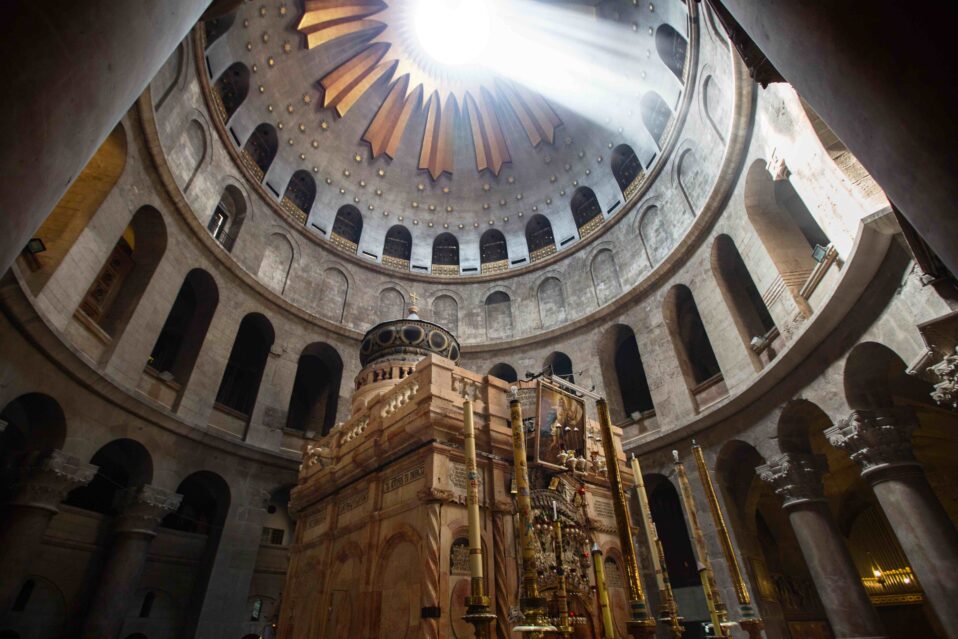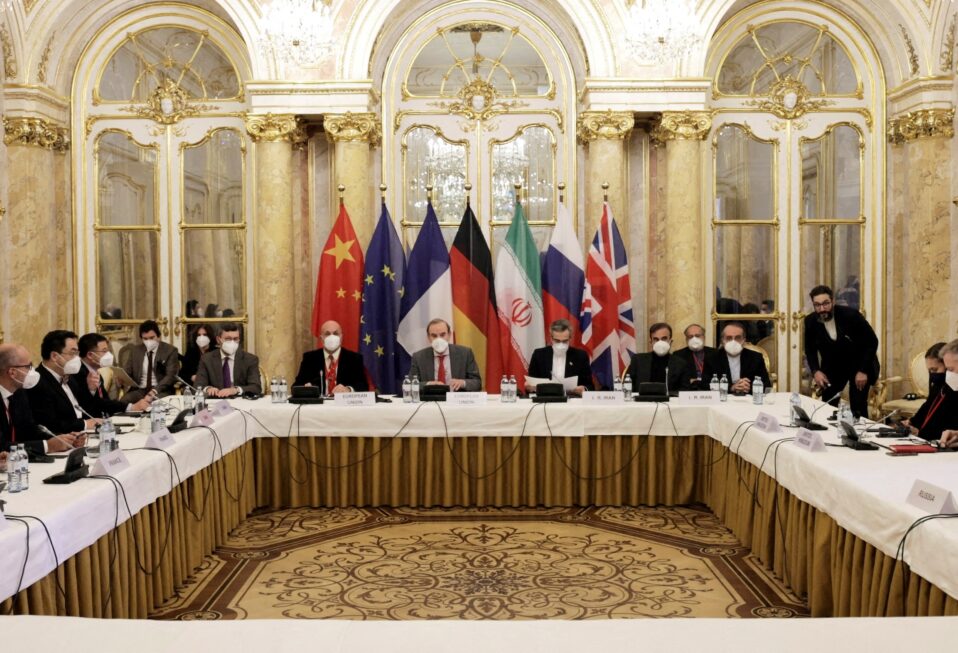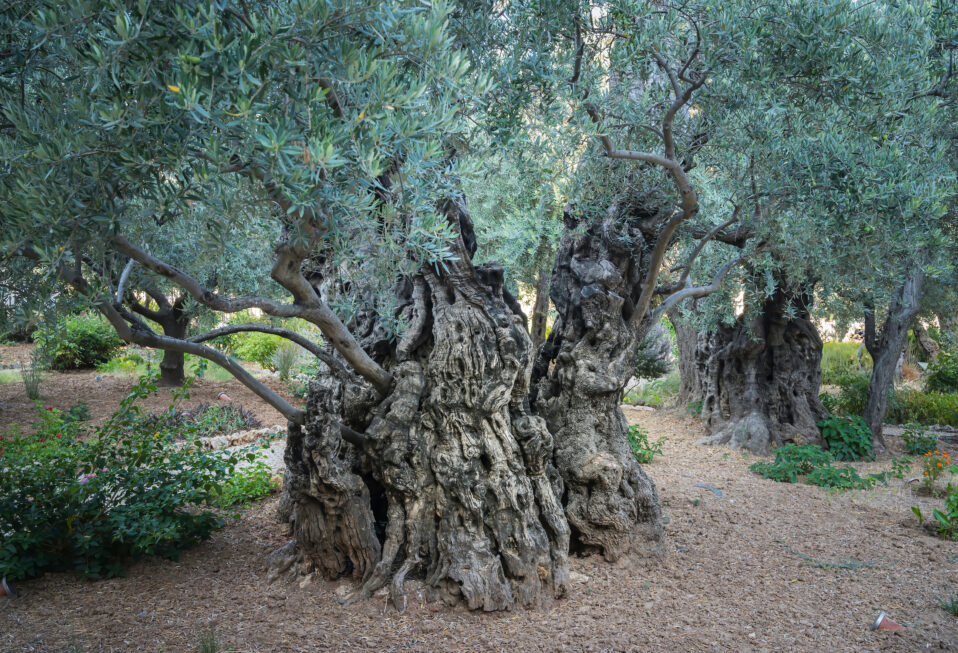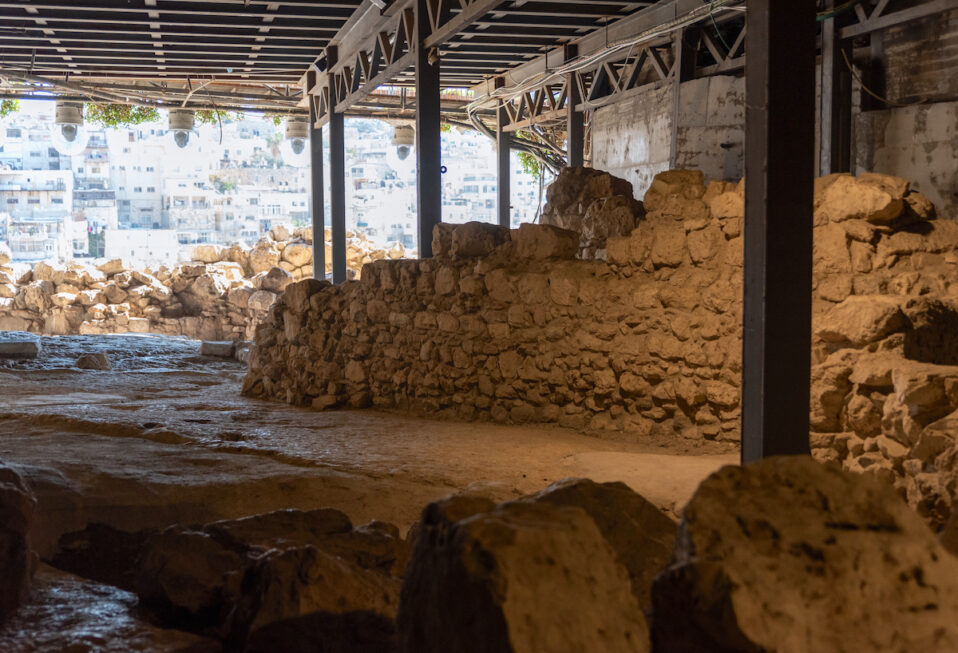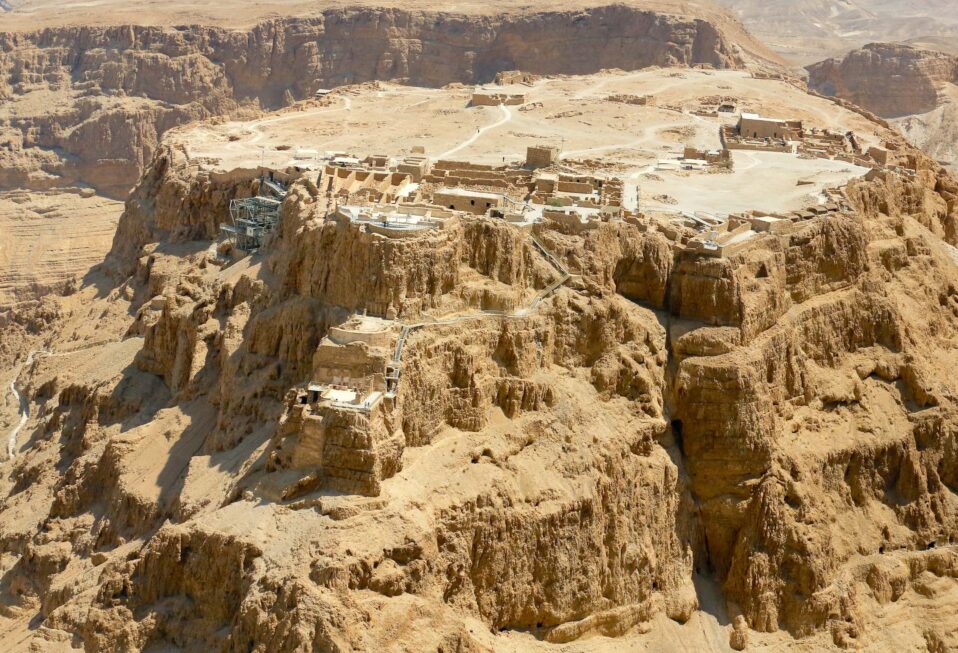By Marc Turnage
The traditional location of the crucifixion, burial, and resurrection of Jesus is the Church of the Holy Sepulchre, which sits within the heart of the Christian Quarter of the Old City of Jerusalem. The origin of the church goes back to the Emperor Constantine. His mother the Empress Helena on a visit to the Holy Land (326 A.D.) was shown this location by local Christians and identified as the place where Jesus’ crucifixion and burial took place. Upon that site, her son built the first church, which was called the Church of the Resurrection.
Archaeological excavations within the church have uncovered the history of the site. In the 8th-7th centuries B.C., the location of the Holy Sepulchre was a large limestone quarry to the northwest of the walled city of Jerusalem. According to the excavator, the site continued to be used as a quarry until the first century B.C. when it was filled in with soil and stone flakes from the quarry. The site at this time became a garden or orchard that contained fig, carob, and olive trees. At the same time, it developed into a cemetery. Within the complex of the Holy Sepulchre, tombs dating to the first century have been discovered.
One of the challenges for modern visitors to the church is its location within the modern Old City of Jerusalem and its walls. Jesus was crucified outside of the city walls. The modern Old City walls, built in the 16th century, however, have nothing to do with the walls of Jesus’ Jerusalem. Jews did not bury within the walls of city, but rather outside. The presence of first century tombs within the Holy Sepulchre complex indicates that this location stood outside the walls of Jerusalem in Jesus’ day.
Jewish tombs in the first century consisted of two types: kokhim and arcosolia. The most common being the kokhim. A kokh (singular) was a long, narrow recess cut into a rock tomb in which a body, coffin, or ossuary (bone box) could be laid. The typical kokhim tomb was hewn into the hillside and consisted of a square chamber. The entrance to an ordinary kokhim tomb was a small square opening that required a person entering to stoop. The height of the chamber was usually less than that of a person, so they often cut a square pit into the floor of the chamber. This pit created a bench on three sides of the chamber where the bodies of the deceased could be prepared.
After the chamber and the pit were cut, the kokhim were cut level with the top of the benches and perpendicular to the wall of the tomb in a counter clockwise direction, from right to left, in every wall except the entrance wall. One to three kokhim were usually cut per wall. The kokh had roughly vaulted ceilings and were the length of the deceased or a coffin. After the deceased was placed into the kokh, a blocking stone sealed the square entrance of the tomb. Small stones and plaster helped to further seal the blocking stone. The tomb was sealed in a manner that it blended into the surrounding hillside.
In addition to the kokhim tomb, arcosolia tombs began to appear sporadically during the first century. The arcosolia is a bench-like aperture with an arched ceiling hewn into the length of the wall. This style of burial was more expensive since only three burial places existed within a tomb chamber instead of six or nine, as typically found within kokhim tombs. Approximately 130 arcosolia tombs have been discovered in Jerusalem and over half of them also contain kokhim. Ossuaries (bone boxes) could be placed on the arcosolia benches.
The tomb identified within the Holy Sepulchre as the tomb of Jesus was originally an arcosolium (singular) with an antechamber; however, the centuries of pilgrims and the various destructions of the church have deformed and obliterated the tomb. What visitors see today is a later structure; nevertheless, the tomb originally contained a first century arcosolium tomb.
The Roman Emperor Hadrian built on top of the quarry-garden-cemetery a raised platform with another platform on it where he built a temple to Venus/Aphrodite in the second century. This pagan temple was removed when Constantine built his church.
Constantine built a rotunda around Jesus’ tomb. The rock of Golgotha was exposed to the open air in a garden, and on the other side of the garden, Constantine built a basilica church.
The question arises whether or not the Holy Sepulchre contains the location of Jesus’ tomb. What we can say is this: 1) The site was a cemetery in the first century with first century tombs. 2) From the second century until the arrival of the Empress Helena, the actual tomb had been covered for 300 years. The fact that the local Christian memory remembered this location, where a first century cemetery existed, even though it was covered by the Hadrianic temple strongly suggests the authenticity of the site. 3) When Helena was shown this site, it sat like now within the walled, urban city of Jerusalem, which would have seemed strange to ancient pilgrims as it does to modern.
Yet, the memory of the local Christian community remembered that this location once lay outside of the walls of Jerusalem. Ten to fifteen years after Jesus’ death and burial a wall was built in Jerusalem that enclosed this area into the city.
Pilgrims to Jerusalem often wonder if the Holy Sepulchre marks the site of Jesus’ crucifixion, burial, and resurrection. The archaeology and tradition of the site support its claims.
Marc Turnage is President/CEO of Biblical Expeditions. He is an authority on ancient Judaism and Christian origins. He has published widely for both academic and popular audiences. His most recent book, Windows into the Bible, was named by Outreach Magazine as one of its top 100 Christian living resources. Marc is a widely sought-after speaker and a gifted teacher. He has been guiding groups to the lands of the Bible—Israel, Jordan, Egypt, Turkey, Greece, and Italy—for over twenty years.
Website: WITBUniversity.com
Facebook: @witbuniversity
Podcast: Windows into the Bible Podcast


